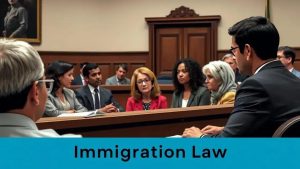Civil rights organizations’ legal actions to make a difference

Anúncios
Civil rights organizations’ legal actions play a crucial role in advocating for equality, addressing discrimination, and shaping laws to protect individual rights in society.
Civil rights organizations’ legal actions play a pivotal role in shaping our society. But how do these organizations navigate the intricate landscape of justice? Let’s delve into their significant contributions.
Anúncios
Understanding civil rights organizations
Understanding civil rights organizations is essential for grasping the fight for equality and justice in society. These groups advocate tirelessly for the rights of marginalized communities, aiming to create a more just world.
Historically, these organizations have played a crucial role in challenging unfair laws and discrimination. They work through legal action and policy advocacy, fighting for the civil liberties of all individuals, regardless of race, gender, or socioeconomic status. Their efforts have led to significant changes in laws that protect vulnerable populations.
Anúncios
The Role of Civil Rights Organizations
These organizations serve several important functions:
- Educating the public about civil rights issues.
- Providing legal assistance to those in need.
- Lobbying for policy changes at local, state, and national levels.
- Raising awareness through community outreach programs.
Through education and advocacy, they empower individuals to stand up for their rights and seek justice. They also highlight the ongoing challenges faced by various communities, reminding us that the struggle for equality is far from over.
Notable Civil Rights Organizations
Several key organizations have made remarkable contributions throughout history:
- The NAACP (National Association for the Advancement of Colored People)
- The ACLU (American Civil Liberties Union)
- The Southern Poverty Law Center
- The Human Rights Campaign
Each of these organizations has a unique focus but shares a common goal: to protect and promote civil rights. Their legal actions have challenged laws that infringe upon individual freedoms and have brought attention to injustices that require societal change.
As we delve deeper into the impact of these groups, it’s vital to appreciate their resilience and the victories they have achieved. Understanding the basic principles behind civil rights organizations equips us to support their ongoing efforts in the fight for justice and equality.
Historical overview of legal actions

A historical overview of legal actions taken by civil rights organizations reveals a powerful narrative of struggle and triumph. These actions have shaped our legal landscape and fought for the rights of countless individuals.
One of the significant moments in history occurred during the mid-20th century. Civil rights activists began to challenge segregation and discriminatory laws through strategic lawsuits, advocating for change within the judicial system. Notable cases, such as Brown v. Board of Education in 1954, played a pivotal role in dismantling segregation in public schools, highlighting the effectiveness of legal actions.
Key Legal Milestones
Several landmark legislation outcomes stem from these legal battles, which include:
- The Civil Rights Act of 1964, prohibiting employment discrimination.
- The Voting Rights Act of 1965, ensuring access to the ballot for all citizens.
- Fair Housing Act of 1968, which made housing discrimination illegal.
- The Americans with Disabilities Act of 1990, providing protection for individuals with disabilities.
Each of these legal actions was driven by relentless advocacy from civil rights organizations, demonstrating their commitment to fighting injustices. The success of these cases not only changed laws but also shifted societal perceptions about race, equality, and justice.
The ongoing fight for civil rights continues to evolve, with current legal actions addressing issues like police reform and voter suppression. As these organizations persist in their efforts, they adapt their strategies to tackle new challenges, ensuring that the quest for equality remains a priority. Legal actions have proven to be a critical tool for change, impacting the lives of many and advancing the rights of underrepresented groups.
Key legal victories in civil rights
Key legal victories in civil rights represent monumental shifts towards equality and justice. These cases not only changed laws but also transformed societal views on race and freedom.
One of the landmark cases was Brown v. Board of Education, decided in 1954. This case deemed segregated schools unconstitutional. It was a bold step against racial segregation, showing that separate educational facilities were inherently unequal.
Important Legal Victories
Several other significant legal victories have fortified the foundation of civil rights in America:
- The Civil Rights Act of 1964: This landmark legislation prohibited discrimination based on race, color, religion, sex, or national origin.
- The Voting Rights Act of 1965: This act aimed to overcome legal barriers at the state and local levels that prevented African Americans from exercising their right to vote.
- Roe v. Wade (1973): This key Supreme Court decision recognized a woman’s legal right to have an abortion, impacting women’s rights significantly.
- Obergefell v. Hodges (2015): This ruling granted same-sex couples the right to marry, affirming the rights of LGBTQ+ individuals across the nation.
These victories demonstrate the crucial role of legal actions in advancing civil rights. They serve as powerful examples of how dedicated organizations and individuals can challenge injustice. The impact of these decisions continues to influence current movements for equality and justice.
As civil rights organizations strive for ongoing advocacy, they build upon these foundations to address systemic racism and inequality. Recent legal challenges continue to push for reforms in various social issues, ensuring the fight for civil rights remains alive and relevant in today’s society.
Challenges faced by these organizations

Challenges faced by civil rights organizations are significant and varied, impacting their ability to advocate for justice effectively. These organizations operate in a landscape that is often fraught with obstacles.
One major challenge is funding. Many civil rights organizations rely on donations and grants to support their work. When funding is limited, it can restrict their ability to hire staff, run programs, and engage in legal battles. Still, they persist, knowing that their work is vital for promoting equality.
Common Obstacles
Organizations also face political and legal hurdles. Some of the key obstacles include:
- Resistance from lawmakers: Many civil rights organizations encounter pushback from politicians who oppose their initiatives.
- Legal barriers: They might face challenges in court that make it difficult to advance their causes.
- Public perception: Misunderstanding or negative perceptions of their goals can lead to a lack of support from the community.
- Internal challenges: Maintaining unity and focus within the organization can be demanding, particularly in times of crisis.
Despite these challenges, civil rights organizations continue to innovate and adapt their strategies. They often collaborate with other groups to amplify their voices and mobilize support for their causes. Engaging the community through outreach programs is another way they create awareness and encourage participation.
The resilience of these organizations speaks volumes about their commitment to justice and equality. They understand that challenges are part of their journey, and with determination, they strive to overcome them. The fight for civil rights is ongoing, and these organizations are at the forefront, ready to face whatever challenges arise.
Collaborative efforts for change
Collaborative efforts for change define the modern landscape of civil rights organizations. By joining forces, these groups amplify their impact and address complex issues more effectively. Collaboration is essential in the fight for justice.
Many civil rights organizations partner with various stakeholders, including community groups, churches, and educational institutions. These alliances create a stronger network for advocacy and support. When groups work together, they can share resources, knowledge, and strategies that enhance their missions.
Examples of Collaborative Efforts
Successful collaborations have led to inspiring outcomes and improvements in various areas:
- Community outreach programs: Organizations unite to educate the community on civil rights issues and empower individuals to take action.
- Legal coalitions: Multiple organizations may come together to file lawsuits or advocate for legislative changes that protect civil rights.
- Public awareness campaigns: By pooling resources, organizations can launch effective campaigns that raise awareness about critical issues like discrimination and inequality.
- Training and workshops: Collaborative efforts also include training sessions and workshops for volunteers and community members, teaching them about their rights and how to advocate for them.
These joint initiatives often lead to greater visibility for civil rights issues, encouraging public support and engagement. The collective action demonstrates unity and underscores the importance of solidarity in the struggle for justice.
As challenges continue to emerge in the realm of civil rights, organizations find that collaboration becomes increasingly vital. By working together, they adapt to new obstacles and continue the fight for a more equitable society. The synergy created through collaboration not only strengthens their campaigns but also builds lasting relationships that benefit the community.
The future of civil rights legal actions

The future of civil rights legal actions is a critical topic as society continues to evolve. These actions will play a vital role in shaping the landscape of justice and equality for upcoming generations.
As new social issues arise, civil rights organizations are adapting their strategies and approaches. They are increasingly focusing on technology and social media to mobilize support and advocate for change. This shift allows them to reach wider audiences and engage younger activists who are passionate about justice.
Emerging Trends
Several trends are shaping the future of civil rights legal actions:
- Increased digital advocacy: Online campaigns and social media are becoming essential tools for raising awareness and organizing movements.
- Focus on intersectionality: Future legal actions will address multiple forms of discrimination, recognizing that issues often overlap.
- Global collaboration: Civil rights organizations are connecting with international groups to share resources and strategies, expanding their impact.
- Advancements in technology: Using data analysis and legal tech can enhance their capabilities in research and case preparation.
Though challenges remain, the resolve of civil rights organizations continues to strengthen. As they face issues like systemic racism and inequality, they will need to navigate complex legal landscapes and societal changes. The adaptability of these organizations is crucial for their success in advocating for civil rights.
In the coming years, legal actions will likely expand into new realms, tackling modern issues such as climate justice, digital privacy rights, and health equity. By staying proactive and responsive, civil rights organizations can ensure that the fight for equality remains dynamic and relevant.
FAQ – Frequently Asked Questions about Civil Rights Organizations
What are civil rights organizations?
Civil rights organizations are groups that advocate for the protection and advancement of individuals’ rights to ensure equality and justice for all.
What types of legal actions do these organizations take?
They engage in litigation, lobbying for new laws, and raising public awareness about civil rights issues to challenge discrimination and injustice.
How can I support civil rights organizations?
You can support them by donating, volunteering your time, or participating in awareness campaigns and events to promote their causes.
What challenges do civil rights organizations face?
They often face funding constraints, political opposition, public misunderstanding, and legal barriers that can hinder their efforts to advocate for change.






